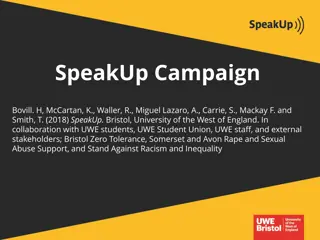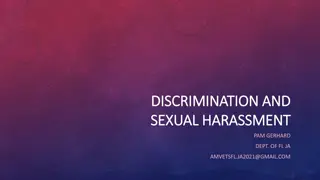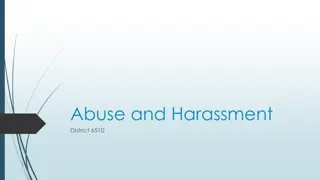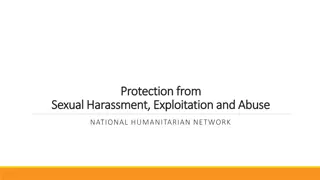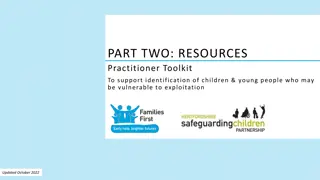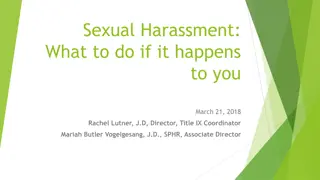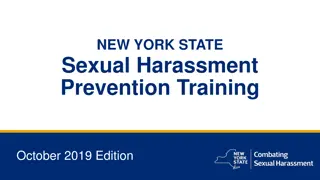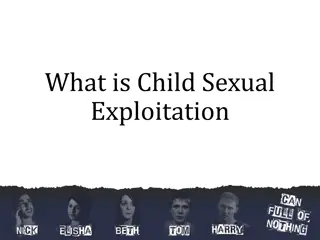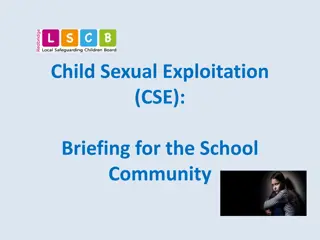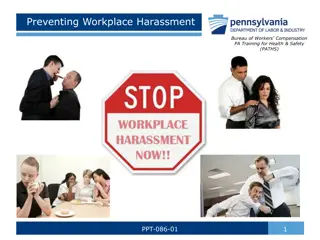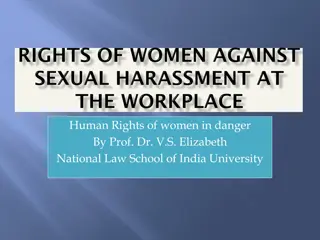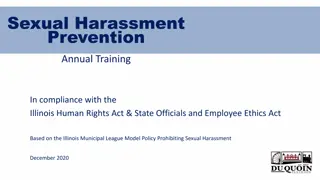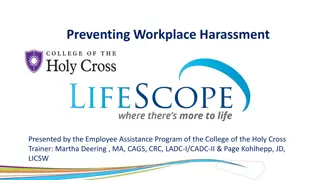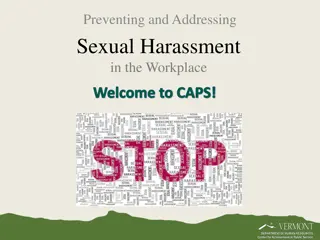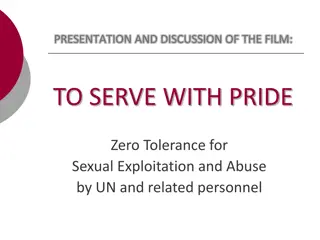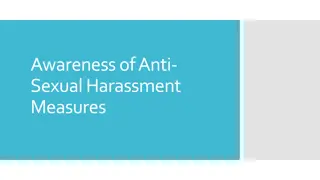Understanding Sexual Harassment and Exploitation in Project Implementation
This comprehensive guide covers sexual harassment and exploitation issues within project implementation, including definitions, responsibilities, legal frameworks, and case studies. It emphasizes the importance of reporting and preventing such misconduct to uphold a safe work environment. The content includes information on SEA, SH, responsibilities of implementing partners, complaint mechanisms, and more.
Download Presentation

Please find below an Image/Link to download the presentation.
The content on the website is provided AS IS for your information and personal use only. It may not be sold, licensed, or shared on other websites without obtaining consent from the author. Download presentation by click this link. If you encounter any issues during the download, it is possible that the publisher has removed the file from their server.
E N D
Presentation Transcript
What You Need to Know (and Do) About SH & SEA and our Implementing Partners By the Taskforce on Prevention of SH & SEA August 2020
Introduction Taskforce on Prevention of SH and SEA: who are we and what we do Tackling SEA with our implementing partners what you need to know and why
(Anonymous) Poll What best describes you right now with respect to dealing with SEA and SH issues with our Implementing Partners and Responsible Parties? o umm what is SEA and SH? o I have heard about SEA and SH but don t know what I am supposed to do about it. o I know a bit about SEA and SH as it relates to UNDP staff, but don t know what it means for our project s implementing partners and responsible parties. o I am very familiar with this issue and what I need to do about it and am just looking for a comprehensive brush up.
Webinar Agenda 5-6 7-8 What is SEA and SH? Implementing Partners & Capacities Legal Framework to Uphold SEA & SH Responsibilities 14-17 Our Responsibilities vis- -vis IPs 18-21 Monitoring as Part of Risk Management & SES 22-24 Complaint Mechanisms & Resources 25-28 Case Studies 9-13
What is Sexual Exploitation & Abuse (SEA)? ST/SGB/2003/13 - Special measures for protection from sexual exploitation and sexual abuse stipulates that: 1. SEA constitutes acts of serious misconduct and are grounds for termination of employment. 2. Sexual activity with children (persons under the age of 18) is prohibited. 3. Exchange of money, employment, goods or services for sex is prohibited. 4. Sexual relationships between UNSP personnel and beneficiaries are strongly discouraged. 5. Personnel must report concerns regarding SEA by fellow workers. 6. UNDP personnel, especially those in leadership positions, are obliged to create and maintain an environment that prevents and protects against SEA.
What is Sexual Harassment (SH)? Sexual harassment is: Any unwelcome sexual advance Request for sexual favor Verbal or physical conduct or gesture of a sexual nature Any other behavior of a sexual nature (including pornography, sexually- colored remarks, etc.) that has or that might reasonably be expected or be perceived to cause offense or humiliation to another. Remember: It s about impact, not always about intent!
Who Are Our Implementing Partners? Implementing Partners Implement UNDP Projects NIM vs. DIM Implementation by Implementing Partner (Management and delivery of outputs) IPs can be Government, UNDP, CSO/NGO, IGO, UN Agencies. CAN NOT be a private sector Contractual (Procurement of goods and services) Delegation to Responsible Parties Provision of Low Value Grants RPs can be private sector, in addition to all other categories LVGs only for CSOs and grassroots organizations
Assessing SEA & SH Capacities Questions on SEA and SH in the Partner Capacity Assessment Tool: Can we still work with a partner if they can t answer yes to all of these questions?
Legal Framework to Uphold These Responsibilities Primary clauses are in the prodoc. Project Document RPs must certify they will adhere to risk management clauses in prodoc. Other Programming Instruments (e.g., RPA, LOA) Commercial Instruments (e.g., Contract for Goods and Services
Project Document Template DIM implementation: In the implementation of the activities under this Project Document, UNDP as the Implementing Partner will handle any sexual exploitation and abuse ( SEA ) and sexual harassment ( SH ) allegations in accordance with its regulations, rules, policies and procedures UN implementation: In the implementation of the activities under this Project Document, [Name of UN Agency/IGO] as the Implementing Partner will handle any sexual exploitation and abuse ( SEA ) and sexual harassment ( SH ) allegations in accordance with its regulations, rules, policies and procedures. Notwithstanding the foregoing, the [Name of UN Agency/IGO], as the Implementing Partner, will notify UNDP of any such allegations and investigations it may conduct further to such allegations.
Project document template NIM and CSO 3. The Implementing Partner acknowledges and agrees that UNDP will not tolerate sexual harassment and sexual exploitation and abuse of anyone by the Implementing Partner, and each of its responsible parties, their respective sub-recipients and other entities involved in Project implementation, either as contractors or subcontractors and their personnel, and any individuals performing services for them under the Project Document. (a) In the implementation of the activities under this Project Document, the Implementing Partner, and each of its sub-parties referred to above, shall comply with the standards of conduct set forth in the Secretary General s BulletinST/SGB/2003/13 of 9 October 2003, concerning Special measures for protection from sexual exploitation and sexual abuse ( SEA ). (b) the Implementing Partner, and each of its sub-parties referred to above, shall not engage in any form of sexual harassment ( SH ). SH is defined as (remaining text on the next slide)
NIM and CSO clauses cont. 4. a) the Implementing Partner [and sub-parties] shall have minimum standards and procedures in place, or a plan to develop and/or improve such standards and procedures in order to be able to take effective preventive and investigative action. These should include: policies on sexual harassment and sexual exploitation and abuse; policies on whistleblowing/ protection against retaliation; and complaints, disciplinary and investigative mechanisms. In line with this, the Implementing Partner will and will require that such sub-parties will take all appropriate measures to: i. Prevent its employees, agents or any other persons engaged to perform any services from engaging in SH or SEA; ii. Offer personnel training on prevention and response to SH and SEA [where not available] the Implementing Partner and its sub-parties may use the training material available at UNDP; iii. Report and monitor allegations of SH and SEA ; iv. Refer victims/survivors of SH and SEA to safe and confidential victim assistance; and v. Promptly and confidentially record and investigate any [credible] allegations.... The Implementing Partner shall advise UNDP of any such allegations received and investigations being conducted and shall keep UNDP informed during the investigation to the extent that such notification (i) does not jeopardize the conduct of the investigation and/or (ii) is not in contravention of any laws applicable to it. Following the investigation, the Implementing Partner shall advise UNDP of any actions taken by it or any of the other entities b) The Implementing Partner shall establish that it has complied to the satisfaction of UNDP... Failure to comply shall be considered grounds for suspension or termination of the Project.
CO Expectations with IPs and RPs When we contract an IP we will be held accountable for their performance and their behavior. Raise the profile of SH & SEA at the start with IPs and RPs, be clear on what you expect from them and provide support. Capacity of the partner is assessed as part of the overall partner assessment. Expectations are outlined in prodoc and partner agreement clauses. For ongoing partnerships, the letter on expectations on SEA should have been sent out. This helps clarify standards. Do outreach, share other information, provide training, build capacity if possible but recognize that many will not be able to meet our standards. Also be clear also on what we cannot do. We cannot investigate but can raise profile and provide advice. That this is often not ideal and victims may be left without support or at risk of retaliation. Don t underestimate donor s increasing scrutiny on this issue. We all need to take this seriously.
We Have a Case Now What? UN Protocol on allegations of SEA involving an IP or RP: (para.20) and its associated personnel, notwithstanding related investigations undertaken by the implementing partner or national authorities. Where the investigation is not conducted by a UN entity directly, the UN partner entity will seek all relevant information to determine whether the implementing partner has taken appropriate investigative and corrective action. The UN entity shall have the right to investigate SEA allegations involving implementing partners Inform management (RR). Discuss with the partner on what steps they are taking, and decide on what action to take if they are in breach of contract. Use corporate resources like OAI for advice. RR will elevate to RBx and HQ (legal, BERA, ExO) as appropriate. OAI does NOT investigate allegations of SEA / SH relating to an IP or RP. Many donors now need to be informed!
Why Cant OAI Investigate? Charter of the Office of Audit and Investigations (OAI): (para.19) OAI shall assess and conduct investigations into allegations of misconduct, such as fraud, theft and embezzlement, corruption, abuse of privileges and immunities, sexual exploitation and abuse, workplace harassment and abuse of authority, retaliation on whistleblowers, or other acts or omissions in conflict with the general obligations of staff members that involve UNDP staff and other personnel. (para.20) Assess and conduct investigations into allegations of fraud and other financial irregularities committed by vendors, Implementing Partners and other third parties, deemed to be detrimental to UNDP.
Informing Donors Once UNDP becomes aware of an incident, CO management should immediately notify their RBx and HQ (BERA and ExO). If a contract needs to be terminated, also involve the legal office. Based on the circumstances (incl. involvement of core or non-core), RBx and the relevant CO, in consultation with BERA and ExO should swiftly determine which donors should be notified and how. Relevant donors should be notified: at HQ level by BERA and at CO level by CO Management. As relevant/appropriate, information shared with donors may include: Basic info on the incident/allegation If donor funds are involved (indirectly via core or directly via non-core) Next-steps or actions planned planed by management
Monitoring SEA & SH Under ERM Identification, assessment and prevention of SEA/SH risks must be part of overall risk identification in the planning process (IWP, Project formulation) and must aligned with the ERM methodology SEA risk is one of the subcategory of risks in the ERM policy. Identified risks must be part of the risk register (project, CO, BU) along with associated mitigation measures. Resident Representative/Head of Office is ultimately responsible for risk management and accountable for ensuring that the Risk Register is regularly monitored, updated, and SEA/SH risks are managed Any risk that cannot be addressed at the CO/programme level can be escalated following ERM escalation procedures.
SEA & SH Integration in the Updated SES What s new in the updated SES: Inclusion of provisions addressing risks of gender-based violence, sexual harassment and sexual exploitation and abuse. Where: Added to Gender and Women s Empowerment Principle, Community Health and Safety, Labour and Working Conditions and Assessment sections. Key Sections: Gender Equality and Women s Empowerment Principle: Zero-tolerance policy for sexual exploitation and abuse involving UNDP personnel as well as personnel of the UNDP implementing partners and responsible parties. UNDP requires that appropriate prevention and response measures be adopted to prevent and to respond effectively ( ) including designing activities to prevent and address potential exposure of project-affected people ( ) screening of personnel; provision of training on prevention and response( ); effective reporting and response protocols; referrals for safe and confidential survivor assistance; and prompt investigation of allegations of GBV related to project activities.
SEA & SH Integration in the Updated SES Standard 3:Community Health, Safety and Security:(Risks associated with influx of project workers): Such risks and impacts may be associated with ( ) threats of sexual violence and harassment ( ). Measures are implemented that seek to protect community members from such risks. Project workers are provided training, awareness raising programmes and codes of conduct. Assessment and Management Section: Potential risks of gender-based violence and/or sexual exploitation and abuse of men, women, girls and boys that may occur in connection with any of supported activities are considered.
Practical Implications Updated SES provide framework for identification/assessment of potential GBV (including SEA/SH) risks within the context of project design and management Facilitates strengthened stakeholder engagement (with partners, donors, project-affected people) to identify and manage risks. Mitigation/Preventative measures for GBV, SEA/SH risks incorporated into Environmental and Social Management Plans for higher risk projects. Project grievance mechanisms provide local mechanisms to receive concerns from project-affected people and identify appropriate channels for response
UNDPs Accountability Mechanism Ensures people affected by projects have access to appropriate grievance resolution procedures for hearing and addressing complaints. An independent Compliance Review process to respond to claims that UNDP is not in compliance with applicable environmental and social requirements. www.undp.org/secu-srm
If You Need Advice Are you looking for advice and support? Office of the Ombudsman Ethics Office Office of Human Resources External Helpline Supervisor Peers and Staff Council Staff counsellors Respectful Workplace Facilitators NEW PSEA Focal Points in 24 countries - NEW Are you looking to report? Office of Audit and Investigation External Helpline Management Same applies if you are a victim or a witness
Key Contacts for Reporting ombudsmediation@fpombudsman.org Office of the Ombudsman: 304 East 45th Street 6th Floor, Room FF-671 New York, NY 10017 USA; http://fpombudsman.org; phone: +1 646 781 4083; ombudsmediation@fpombudsman.org http://www.undp.org/content/undp/en/home/accountability/ethics.html Ethics Office (whistleblower protection/protection from retaliation): ethicsoffice@undp.org, phone: +1-212-909-7840 || fax: +1-212.906.6153; http://www.undp.org/content/undp/en/home/accountability/ethics.html ethicsoffice@undp.org harassment.ohrfocalpoint@undp.org OHR (general inquiries about the UNDP policy on harassment, sexual harassment, discrimination and abuse of authority): harassment.ohrfocalpoint@undp.org || +1-212-906-5254 Office of Audit and Investigation: Online referral form; an independent telephone service: +1 877 557 8685 (within the US) and +1 770 776 5678 (worldwide); reportmisconduct@undp.org Online referral form independent reportmisconduct@undp.org Expolink Helpline: https://wrs.expolink.co.uk/UNDPhelpline https://wrs.expolink.co.uk/UNDPhelpline
CASE STUDY #1: CASE STUDY #1: SEA and SH Allegations in a CSO-Implemented Project Project: Training Centre for youth in agricultural entrepreneurship What happened: As part of project monitoring, conversations with former students on their overall welfare and experience at the Centre revealed indications of widespread SH & SEA by trainers towards students. What victims said: My trainer made sexual advances that I refused and from then onwards he made life difficult for me. Trainers were making visits to girls dormitories at night. I would stop girls from obeying orders which I felt were inappropriate. I am of the opinion that my defiant behavior and vigilance in ensuring the protection of the girls caused me to be victimized by our superiors.
CASE STUDY #1: CASE STUDY #1: SEA and SH Allegations in a CSO-Implemented Project Poll #1: What would you do in this situation? oNothing. It is not my business, and neither the trainees nor trainers are UNDP staff. o Ask around about the reputation of the trainees making these claims to make sure they are credible. o Investigate the situation further by speaking with the head of the Training Centre. o o Tell my supervisor and make sure the RR knows. I don t know. Discussion Question: Would your actions change at all if the implementing partner was a powerful government ministry instead of a CSO?
CASE STUDY #2: CASE STUDY #2: Sexual Harassment Against a Consultant in a Project Location: Project site What happened: A female consultant hired by UNDP was sexually harassed by a male employee of an Implementing Partner of the project. Immediately after experiencing this harassment, the consultant reported the incident to the Implementing Partner and the Country Office HR unit. What victims said: The male employee tried to block the door as she was leaving and told the consultant that he would drop her home on his motorbike. When she refused, he blocked her way and sexually harassed her.
CASE STUDY #2: CASE STUDY #2: Sexual Harassment Against a Consultant in a Project In this scenario, the victim holds a UNDP contract is reporting the sexual harassment by the IP staff directly to Country Office. Poll #2: What would you do in this situation? oNothing. The IP staff does not work for UNDP and there is nothing we can do about this. o Launch a CO-led investigation. o Inform OAI so they can conduct an investigation. o Tell my supervisor and make sure the RR knows. o I don t know
Any Questions? Also visit UNDP s comprehensive site on Prevention of Sexual Exploitation and Abuse: https://intranet.undp.org/unit/ohr/psea/SitePages/Home.aspx




